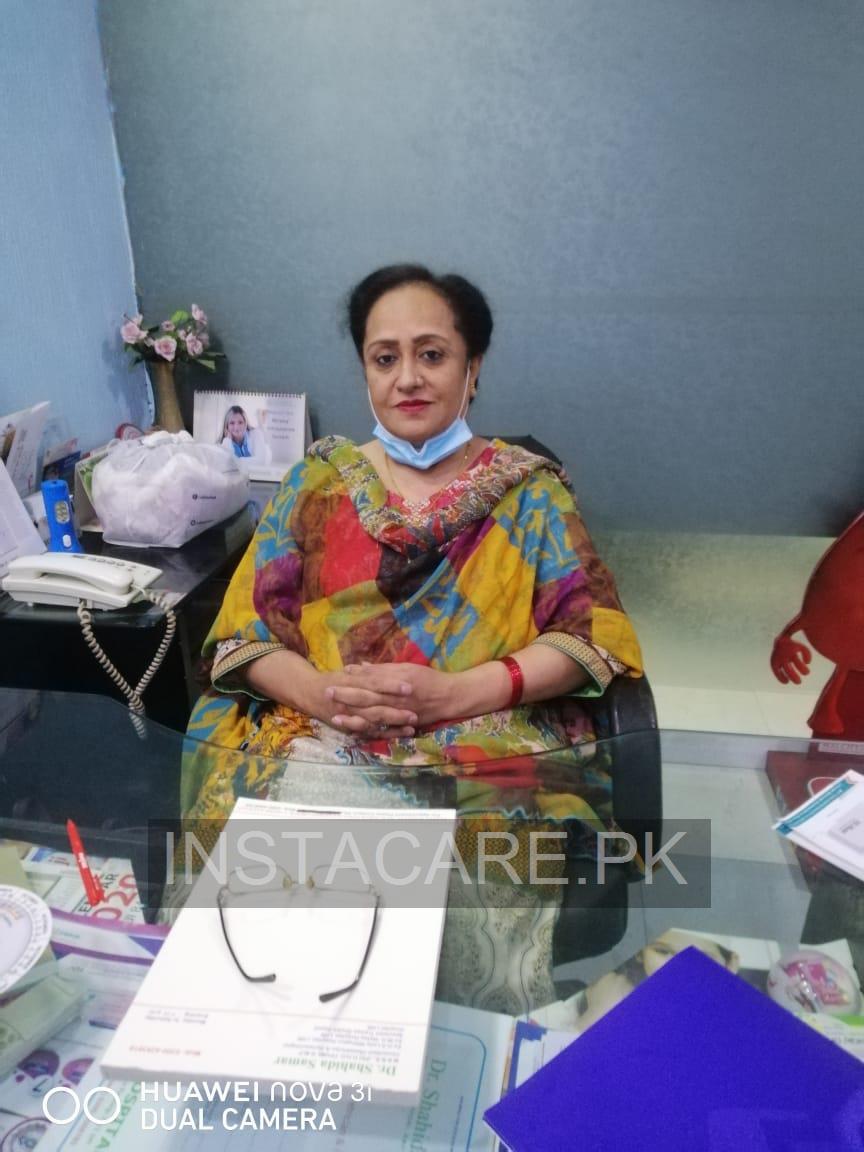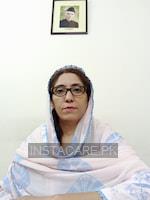Polycystic Ovary Syndrome - Symptoms, Risk factors and Treatment
Last Updated On Monday, July 7, 2025
Polycystic Ovary Syndrome in Urdu
پولی سسٹک اوورین سنڈروم ایک ایسی حالت ہے جو خواتین کے ہارمونز کو متاثر کرتی ہے، تولیدی عمر کے دوران ہوتی ہے، جس کی وجہ سے عدم توازن پیدا ہوتا ہے اور آخر کار اس کی وجہ سے علامات ظاہر ہوتی ہیں۔ PCOs میں، ایک خاتون کا جسم زیادہ مردانہ ہارمون پیدا کرتا ہے جسے اینڈروجن کہا جاتا ہے۔ لہذا یہ طویل عرصے تک ماہواری کے خون کا سبب بن سکتا ہے اور عورت کے لیے حاملہ ہونا مشکل بنا دیتا ہے۔ PCOs مردانہ طرز کے گنجے پن کے ساتھ ہیرسوٹزم (جسم اور چہرے پر بالوں کا بڑھنا) کا سبب بھی بن سکتا ہے۔ مزید یہ کہ اس کی ایک پیچیدگی انسولین کے خلاف مزاحمت ہے جو طویل مدت میں ذیابیطس اور دل کی بیماری کا باعث بن سکتی ہے۔ علاج کے لیے، صحت کی دیکھ بھال فراہم کرنے والے پیدائش پر قابو پانے کی گولیاں اور اینٹی ذیابیطس دوائیں تجویز کر سکتے ہیں۔
پولی سسٹک اوورین سنڈروم ایک سنڈروم ہے جس کا مطلب ہے کہ یہ مختلف علامات ظاہر کرتا ہے۔ اس کی خصوصیت کی جا سکتی ہے؛
ڈمبگرنتی سسٹ
مردانہ ہارمونز کی اعلی سطح - اینڈروجن
فاسد یا چھوڑے گئے ادوار
پولی سسٹک کا لفظ بہت سے سسٹوں سے مراد ہے- جو چھوٹی سی تھیلیاں ہیں جو سیال سے بھری ہوتی ہیں۔ وہ follicles ہیں. ان میں سے ہر ایک میں ایک ناپختہ انڈا ہوتا ہے، جو بیضہ دانی کو متحرک کرنے کے لیے کبھی پختہ نہیں ہوتا ہے۔ بیضہ کی کمی ہارمونز کے عدم توازن کا سبب بنتی ہے، جس سے ایسٹروجن، پروجیسٹرون، ایل ایچ اور ایف ایس ایچ کی سطح میں تبدیلی آتی ہے، جس کے نتیجے میں حاملہ ہونا مشکل ہو جاتا ہے۔ نیز، یہ ماہواری کی لمبائی اور بہاؤ میں خلل ڈالتا ہے۔
Polycystic Ovary Syndrome in English
Polycystic ovarian syndrome is a condition that affects the female hormones, occurs during the reproductive age, causing a disbalance and eventually symptoms due to it. In PCOs, the body of a female produces more male hormones known as androgen. It can therefore cause prolonged menstrual bleeding and makes it harder for the woman to conceive. PCOs can also cause hirsutism (increased hair growth on the body and face) along with male pattern baldness. Moreover, one of its complications is insulin resistance that can lead to diabetes in the long run and heart disease. For treatment, the healthcare providers may prescribe birth control pills and antidiabetic drugs.
The polycystic ovarian syndrome is a syndrome which means it shows various symptoms. It can be characterized by;
- Ovarian cysts
- High levels of male hormones- androgens
- Irregular or skipped periods
The word polycystic refers to many cysts- that are small sacs filled with fluid. They are follicles. Each one of them contains an immature egg, which never matures to trigger ovulation. The lack of ovulation causes an imbalance of hormones, causing an alteration in the levels of estrogen, progesterone, LH, and FSH, which in turn makes it difficult to conceive. Also, it disrupts the length and flow of the menstrual cycle.
Symptoms
The signs and symptoms of polycystic ovarian syndrome may show up at the first menstrual period or sometimes a woman may realize about it once they have gained a lot of weight. Other signs and symptoms may include;
Irregular periods
Women with PCOs may get irregular periods, mostly around 8 in a year. It happens because of a lack of ovulation that prevents the lining from shedding.
Heavy bleeding
The lining of the uterus builds up for a long time, therefore it can cause heavier bleeding than usual.
Hair growth
Most of the women with PCOs have excessive hair growth on the face, chest, belly, and back. It happens because of excessive male hormone secretion. A condition in which excess hair growth occurs on the body of a woman is known as hirsutism.
Acne
Excess of male hormones occurs in polycystic ovarian syndrome, which eventually causes your skin to turn oilier. Therefore, you become prone to breakout and acne. They mostly occur on the face, chest, and upper back.
Weight gain
PCOs can lead to weight gain and it also makes it difficult to lose weight.
Male pattern baldness
In PCOs, the hair of the females become thin and eventually fall off, resulting in male pattern baldness.
Skin darkening
PCOs can cause your skin to darken, especially that of the creases like under the breasts, groin area, and on the neck.
Headache
Hormonal changes occur in PCOs, which can cause headaches too.
Causes
The exact causes of the polycystic ovarian syndrome are unknown. Some of the following factors may play a role in causing it.
Excess insulin
The pancreas in your body produces insulin- a hormone that helps your cells to use insulin, giving your body energy. If that does not happen, excess levels of sugar keep circulating in your body, causing hyperglycemia- a life-threatening condition. However, if your body becomes resistant to insulin, sugar will keep circulating in your blood. In response, your body will secrete more insulin to get rid of the excess circulating insulin. Excess insulin can in turn lead to excess androgen production, causing a disbalance in the hormones.
Hereditary
Having a family history and genetic tendency of PCOs increases the risk for you too.
Inflammation
Most women with PCOs have inflammation. Being overweight or obese can also lead to inflammation. Therefore, it can also be a factor in causing PCOs.
Complications
PCOs can lead to further complications like;
- Infertility
- A metabolic syndrome that includes high blood sugar and high blood pressure. Together they both increase the risk for heart diseases and stroke.
- Sleep apnea
- Endometrial cancer
- Depression
- Anxiety
Treatment
For the treatment of PCOs, your healthcare providers will ask you to lose weight if you are overweight. Moreover, they may prescribe metformin to get rid of insulin resistance.
Conclusion
Polycystic ovarian syndrome is a condition that affects the female hormones, occurs during the reproductive age, causing a disbalance and eventually symptoms due to it. In PCOs, the body of a female produces more male hormones known as androgen. It can therefore cause prolonged menstrual bleeding and makes it harder for the woman to conceive. PCOs can also cause hirsutism- increased hair growth on the body and face and male pattern baldness. Moreover, one of its complications is insulin resistance that can lead to diabetes in the long run and heart disease. For treatment, the healthcare providers may prescribe birth control pills and diabetes drugs.









